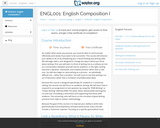
- Subject:
- Applied Science
- English Language Arts
- Health, Medicine and Nursing
- Reading Foundation Skills
- Material Type:
- Lecture
- Provider:
- CUNY Academic Works
- Provider Set:
- Kingsborough Community College
- Author:
- Limandri, Dina
- Date Added:
- 05/27/2014


The Double Entry Journal is a note-taking technique for English Composition courses that encourages students to become active readers.

Course Description: Students in this course examine developmental and pedagogical principles of language and literacy development and explore best-practices in curriculum and instruction for promoting language and literacy skill acquisition for a diverse population of students. Techniques and strategies are presented for addressing the diverse language and literacy needs of students with disabilities, English Language Learners, and students at risk for school failure at thesecondary level. Candidates will also examine reading and writing levels, formative evaluation strategies, motivational influences, uses of relevant technology and individual and group strategies for supporting language and literacy skill development.Fieldwork is required in the course that includes assessing students, planning interventions, progress monitoring, interviewing school personnel and collaborating with colleagues in the class.

This course promotes clear and effective communication by sharpening critical thinking and writing skills. The first unit is designed to change the way in which students think about writing--as a conversation rather than a solitary act. The second unit focuses on academic writing and explores the PWR-Writing or Power-Writing Method (PWR Pre-Write, Write, Revise). The remaining units will focus on the minutiae of good writing practices, from style to citation methodology. Upon successful completion of this course, the student will be able to: Demonstrate mastery of principles of grammar, usage, mechanics, and sentence structure. Identify the thesis in another individual's essay. Develop a thesis statement, structure it in an introductory paragraph, and support it with the body of the essay. Organize ideas logically within an essay, deploying adequate transitional devices to ensure coherence, flow, and focus. Differentiate between rhetorical strategies and write with an awareness of rhetorical technique and audience. Differentiate between tones and write with an awareness of how tone affects the audience's experience. Demonstrate critical and analytical thinking for reading and writing purposes. Quote, paraphrase, and document the work of others. Write sentences that vary in length and structure. (English 001)

This phase two writing assignment prompt for FIQWS 10003 - HA1 WCGI History & Culture and FIQWS 10103 - HA1 Composition for WCGI History & Culture (fall 2018) provides guidelines for writing an Exploratory Essay in which students will consider the ideas of course readings and compose an essay that demonstrates their engagement with those ideas. The rhetorical purpose of this assignment is for students to demonstrate the ways in which their thinking about language and literacy has developed so far in the course, using evidence based on interpretations, ideas, and examples as well as passages from four or five sources. Summary, synthesis, and crafting effective thesis statements are the primary critical reading and writing strategies required in this assignment.

This syllabus is for a Freshmen Inquiry Writing Seminar, which is a two-section, collaboratively taught course wherein one of the two courses engages students in critical thinking, reading, and writing about the issue of language and literacy, while the other introduces students to conventions of academic writing and mentors them in social and rhetorical writing processes. Thus, this course draws on the topic of language and literacy as a vehicle for critically analyzing students' own languages and literacies and developing especially their academic and information literacies.

This syllabus is for a Freshmen Inquiry Writing Seminar, which is a two-section, collaboratively taught course wherein one of the two courses engages students in critical thinking, reading, and writing about the issue of language and literacy, while the other introduces students to conventions of academic writing and mentors them in social and rhetorical writing processes. Thus, this course draws on the topic of language and literacy as a vehicle for critically analyzing students' own languages and literacies and developing especially their academic and information literacies.

This syllabus is for a Freshmen Inquiry Writing Seminar, which is a two-section, collaboratively taught course wherein one of the two courses engages students in critical thinking, reading, and writing about the issue of language and literacy, while the other introduces students to conventions of academic writing and mentors them in social and rhetorical writing processes. Thus, this course draws on the topic of language and literacy as a vehicle for critically analyzing students' own languages and literacies and developing especially their academic and information literacies.

This assignment is inspired by the learnings that arose from the workshop, “Fostering Play in the Classroom - Pedagogies to Build Creativity, Connection and Light to Oppressive Spaces”. Based on group dialogue, feedback, and the desire to build on pedagogies of play in the workshop, this science fiction short story assignment has been created as an additional layer of liberatory, contemplative learning for students that can be used/tweaked to work in a variety of courses. Powerful conversations arose in the workshop surrounding power/oppression, positionality and how this impacts our ability to engage in play, and the importance of holding both/and (i.e. - joy/sadness, pain/pleasure, restriction/liberation). This assignment attempts to deepen these reflections through creativity, storytelling, and removal of limits for dreaming in a world with obstacles.